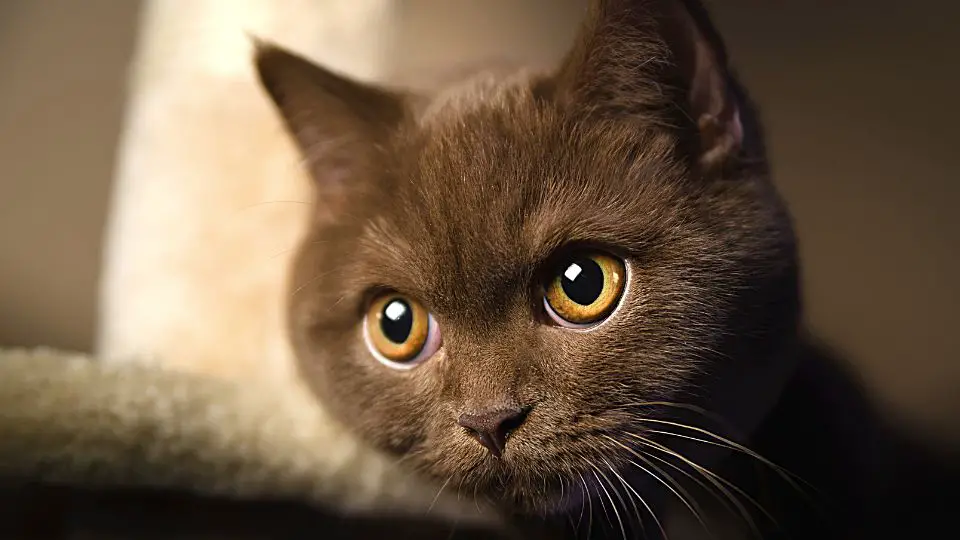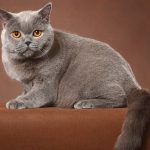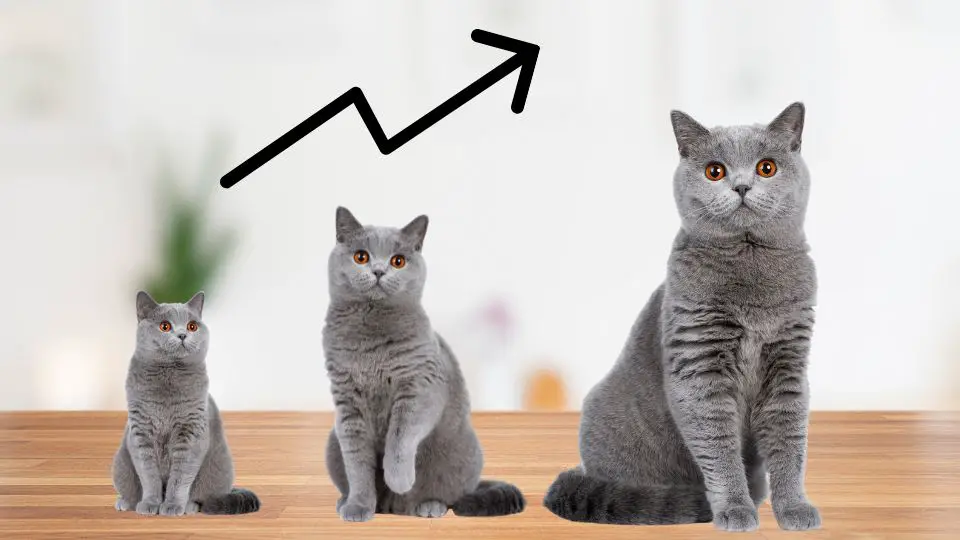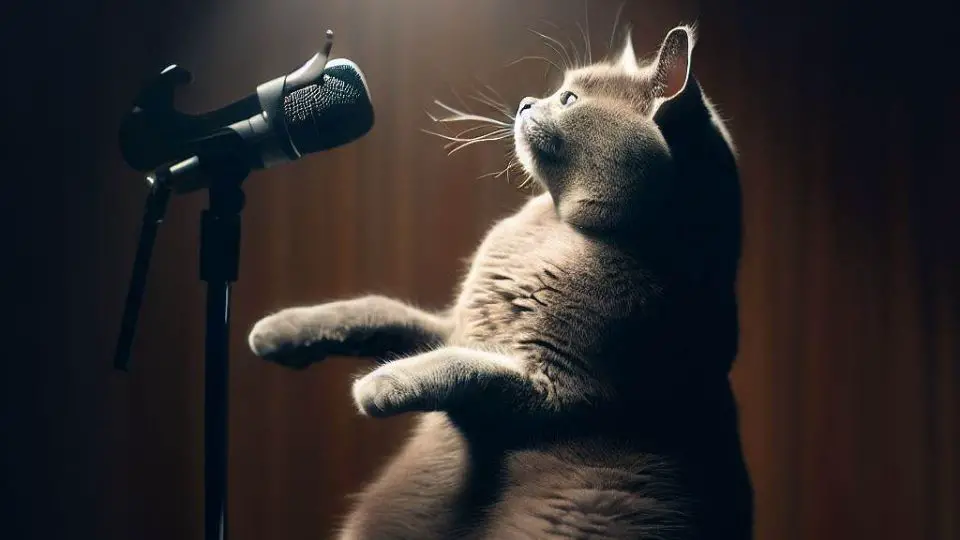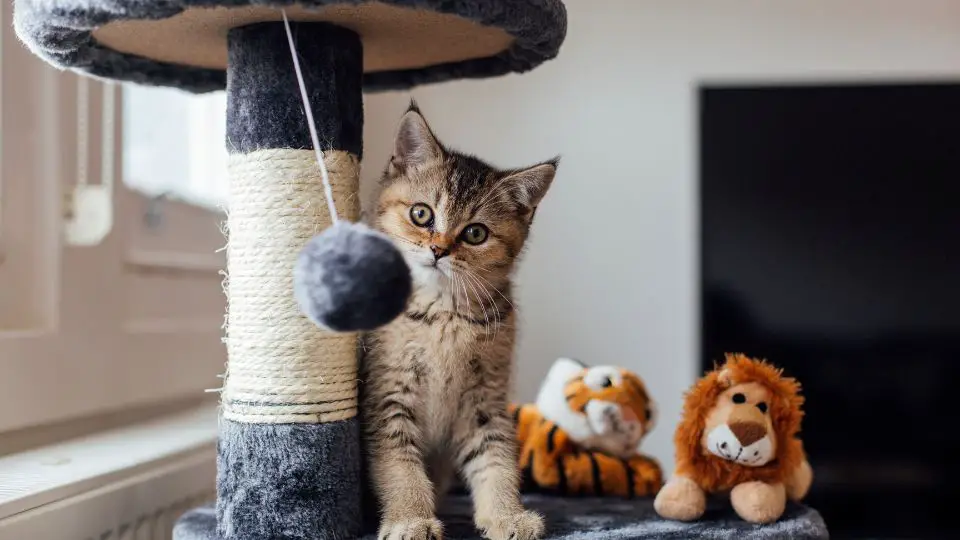As a cat owner, it’s important to maintain a healthy weight for your British Shorthair cat to prevent health problems and ensure their overall wellbeing.
However, it can be difficult to determine if your cat is overweight, especially if you’re not familiar with their ideal weight range.
In this article, we will explore how to tell if your British Shorthair cat is overweight, and what steps you can take to help them achieve a healthy weight.
How can I tell if my British Shorthair is overweight?
The most common way to determine if a cat is overweight is by feeling their ribs. When you run your hands along your cat’s sides, you should be able to feel their ribs without applying too much pressure. If you cannot feel your cat’s ribs, or if they are covered by a thick layer of fat, then your cat may be overweight.
Another way to determine if a cat is overweight is by observing their body shape. An overweight cat may have a rounded belly and thick waistline. They may also have fat deposits on their back, neck, and hips.
Ideal British Shorthair weight by age
For Male British Shorthair Cats:
- Kitten (up to 6 months): 2-4 pounds (0.9-1.8 kg)
- Junior (6-12 months): 4-8 pounds (1.8-3.6 kg)
- Adult (1-3 years): 9-12 pounds (4.1-5.4 kg)
For Female British Shorthair Cats:
- Kitten (up to 6 months): 2-4 pounds (0.9-1.8 kg)
- Junior (6-12 months): 4-8 pounds (1.8-3.6 kg)
- Adult (1-3 years): 8-11 pounds (3.6-5 kg)
It’s important to keep in mind that each cat is unique and may have different body types and metabolisms. Consult with your veterinarian for personalized recommendations for your cat’s specific dietary needs and ideal weight range.
If your British Shorthair is a bit out of above range does not necessarily represent a concern, but it might be time to take actions decribed below in this article to prevent him getting overweight.
What to do if your British shorthair is overweight
If you determine that your British Shorthair is overweight, there are several actions that can be taken to address the issue:
- Consult with a veterinarian: A veterinarian can provide guidance on the appropriate weight for your cat based on their age, size, and breed. They can also recommend a healthy diet and exercise plan.
- Adjust their diet: Feed your cat a high-quality, balanced diet and measure out their food portions to prevent overeating. Avoid feeding your cat table scraps or human food, which can be high in calories and unhealthy for cats.
- Increase exercise: Encourage your cat to exercise by providing them with toys, scratching posts, and climbing structures. Play with your cat regularly and incorporate interactive toys that encourage physical activity.
- Monitor progress: Weigh your cat regularly and monitor their body condition to track their progress. If your cat is not losing weight or is gaining weight, consult with a veterinarian for further guidance.
How to prevent your British Shorthair to get overweight
Preventing obesity in British Shorthair cats is important for their health and longevity. Here are some tips to help prevent your British Shorthair from becoming overweight:
Feed a High-Quality Diet
A high-quality diet is essential for your cat’s health and wellbeing. Look for cat food that is high in protein and low in carbohydrates. Avoid cat food that contains fillers such as corn, wheat, and soy, as these can contribute to weight gain. A high-quality diet will help keep your cat feeling full, reduce their urge to overeat, and provide them with the necessary nutrients for good health.
Measure Food Portions
Feeding your cat the appropriate amount of food is crucial in preventing weight gain. Measuring your cat’s food portions can help ensure they are not overeating. Follow the feeding instructions on the cat food package or consult with your veterinarian to determine the appropriate portion size for your cat’s age, weight, and activity level.
Limit Treats
While treats can be a great way to reward your cat, they can also contribute to weight gain. Limit treats to no more than 10% of your cat’s daily caloric intake. Consider using low-calorie treats or small pieces of your cat’s regular food as a treat.
Encourage Exercise
Encouraging your British Shorthair cat to exercise is essential in maintaining a healthy weight. Provide them with toys, scratching posts, and climbing structures to encourage physical activity. Play with your cat regularly and incorporate interactive toys that encourage physical activity. Engaging in regular playtime with your cat can also strengthen the bond between you and your pet.
Regular Check-Ups
Schedule regular check-ups with your veterinarian to monitor your cat’s weight and overall health. Your veterinarian can help determine if your cat is at a healthy weight and provide guidance on maintaining their weight through diet and exercise.
How big do British Shorthair cats grow and stll be healthy?
British Shorthair cats typically reach their full size at around 3 years old. Adult British Shorthair cats can weigh anywhere from 8-12 pounds, with males typically being larger than females.
Diet that prevents British Shorthair from getting overweight
Here is a list of food that British Shorthair cats can be fed to prevent obesity:
- High-quality dry cat food that is rich in protein and low in carbohydrates
- Wet cat food that is low in fat and carbohydrates
- Lean meats, such as cooked chicken, turkey, or beef
- Cooked vegetables, such as green beans or carrots
- High-fiber cat treats that are low in calories
- Small amounts of plain, cooked rice or pasta as a treat
- Limited amounts of low-fat dairy products, such as plain yogurt or cottage cheese
Remember to always measure food portions to prevent overfeeding, and consult with your veterinarian for personalized recommendations for your cat’s specific dietary needs.
Conclusion
In conclusion, being able to tell if your British Shorthair cat is overweight is an important part of maintaining their health and wellbeing. By monitoring your cat’s weight, body condition, and feeding habits, you can help prevent health problems and ensure a long and happy life for your feline companion.
If you’re concerned that your British Shorthair cat may be overweight, consult with your veterinarian for personalized recommendations for your cat’s specific dietary needs and ideal weight range. By working together with your veterinarian, you can help your British Shorthair cat achieve and maintain a healthy weight for years to come.

